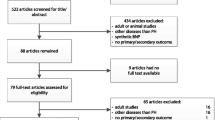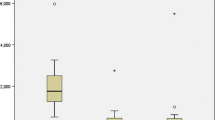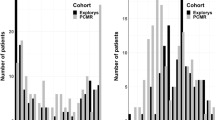Abstract
Background
Serum concentrations of N-terminal natriuretic pro-brain natriuretic peptide (NT-proBNP) correlate well with the severity of cardiac disease in children and adults. There are also paediatric illnesses of extracardiac origin that may cause deterioration of the cardiac function in some patients (pts). A high NP level can signify a concomitant cardiac involvement in respiratory distress, or secondary to a systemic disease.
Objective
To assess the potential of NT-proBNP as a screening tool for cardiac involvement in paediatric diseases of extracardiac origin.
Methods
A literature search was performed in PubMed for the relevant studies with the subject brain natriuretic peptide (BNP) and NT-proBNP from 1995 to 2010 with stress on characteristics of the natriuretic peptides, paediatric reference values and systemic paediatric diseases with potential influence on the myocardial performance. The main focus has been NT-proBNP being the most stable NP and correlating well with BNP.
Results
Most studies agree that a high NT-proBNP level indicates cardiac dysfunction in different systemic diseases such as thalassemia and cystic fibrosis or in pts after chemotherapy. In special clinical scenarios as sepsis or respiratory distress, NT-proBNP helps to narrow down the differential diagnosis or can be used for risk stratification.
Conclusion
NT-proBNP can serve as a screening tool in various primarily non-cardiac paediatric diseases. Together with the clinical picture, a high level suggests further assessment by a paediatric cardiologist.
Similar content being viewed by others
Abbreviations
- NT-proBNP:
-
N-terminal natriuretic pro-brain natriuretic peptide
- BNP:
-
Brain natriuretic peptide
- NP:
-
Natriuretic peptide
- ECHO:
-
Echocardiogram
- eGFR:
-
Effective glomerulation filtration rate
- KD:
-
Kawasaki disease
- PDA:
-
Patent ductus arteriosus
- PHT:
-
Pulmonary hypertension
- CF:
-
Cystic fibrosis
- APSGN:
-
Acute post streptococcal glomerulonephritis
- DMD:
-
Duchenne muscular dystrophy
- IVIG:
-
Intravenous immunoglobulin
References
Daniels LB, Maisel AS (2007) Natriuretic Peptides. J Am Coll Cardiol 50:2357–2368
Levin ER, Gardner DG, Samson WK (1998) Natriuretic peptides. N Engl J Med 339(5):321–328
Cortes R, Otero MR, Morillas P, Rosello-Lleti E, Grigorian L, Marinez-Dolz L, de Burgos FG, Calabuig JR, Soria F, Lozano T, Portoles M, Bertomeu V (2008) Obese and nonobese patients with essential hypertension show similar N-terminal proBNP plasma levels. Am J Hypertens 21:820–825
Hammerer-Lercher A, Mair J, Tews G, Puschendorf B, Sommer R (2005) N-terminal pro-B-type natriuretic peptide concentrations are markedly higher in the umbilical cord blood of newborns than in their mothers. Clin Chem 51(5):913–915
Bar-Oz B, Lev-Sagie A, Arad I, Salpeter L, Nir A (2005) N-terminal pro-B-type natriuretic peptide concentrations in mothers just before delivery, in cord blood and in newborns. Clin Chem 51(5):26–927
Lin NC, Landt ML, Trinkhaus KM, Balzer DT, Kort HW, Canter CE (2005) Relation of age, severity of illness, and hemodynamics with brain natriuretic peptide levels in patients <20 years of age with heart disease. Am J Cardiol 96(6):847–850
Norozi K, Binder L, Brack C, Pottho L, Hess G, Wessel A (2008) Intravenous luteinizing hormone-releasing hormone has no effect on serum N-terminal pro-brain natriuretic peptide in children and adolescents. Pediatr Int 50:1–6
Bruch C, Fischer C, Sindermann J, Stypmann J, Breithardt G, Gradaus R (2008) Comparison of the prognostic usefulness of N-terminal pro-brain-natriuretic peptide in patients with heart failure with versus without chronic kidney disease. Am J Cardiol 102:469–474
Das SR, Abdulla SM, Leonard D, Drazner MH, Khera A, McGuire DK, de Lemos JA (2008) Association between renal function and circulating levels of natriuretic peptides (from the Dallas heart study). Am J Cardiol 102:1394–1398
Kato K, Murakami H, Isozaki O, Tsushima T, Takomo K (2008) Serum concentrations of BNP and ANP in patients with Thyrotoxicosis. Endocr J (Epub ahead of print)
Ozmen B, Ozmen D, Parildar Z, Mutaf I, Bayindir O (2007) Serum N-terminal-pro-B-type natriuretic peptide (NT-pro-BNP) levels in hyperthyroidism and hypothyroidism. Endocr Res 32(1–2):1–8
Henrikson JH, Gotze JP, Fuglsang S, Christensen E, Bendtsen F, Moller S (2003) Increased circulating pro-brain natriuretic peptide (proBNP) and brain natriuretic peptide (BNP) in patients with cirrhosis: relation to cardiovascular dysfunction and severity of disease. Gut 52(10):1511–1517
Fried I, Bar-Oz B, Algur N, Fried E, Gavri S, Yatsiv I, Perles Z, Rein AJ, Bass R, Nir A (2006) Comparison of N-terminal pro-B-type natriuretic peptide levels in critically ill children with sepsis versus acute left ventricular dysfunction. Pediatrics 118(4):e1165–e1168
Johns MC, Stephenson C (2008) Amino-terminal pro-B-type natriuretic peptide testing in neonatal and pediatric patients. Am J Cardiol 101(S):76A–81A
Soldin SJ, Soldin OP, Boyajian AJ, Taskier MS (2006) Pediatric brain natriuretic peptide and N-terminal pro-brain natriuretic peptide reference intervals. Clinica Chimica Acta 366:304–308
Nir A, Lindinger A, Rauh M, Bar-Oz B, Laer S, Schwachtgen L, Koch A, Falkenberg J, Mir TS (2009) NT-pro-B-type natriuretic peptide in infants and children: reference values based on combined data from four studies. Pediatr Cardiol 30:3–8
Baggish AL, van Kimmenade RRJ, Januzzi JL (2008) The differential diagnosis of an elevated amino-terminal pro-B-type natriuretic peptide level. Am J Cardiol 101(suppl):43A–48A
Farombi-Oghuvbu I, Matthews T, Mayne PD, Guerin H, Corcoran JD (2008) N-terminal pro-B-type natriuretic peptide: a measure of significant patent ductus arteriosus. Arch Dis Child Fetal Neonatal Ed 93:F257–F260
Nuntnarumit P, Khositseth A, Thanomsingh P (2009) N-terminal probrain natriuretic peptide and patent ductus arteriosus in preterm infants. J Perinatol 29:137–142
Kawamura T, Wago M, Kawaguoni H, Tahara M, Yuge M (2000) Plasma brain natriuretic peptide concentrations in patients with Kawasaki disease. Pediatr Int 42:241–248
Das BB, Raj S, Solinger R (2009) Natriuretic peptides in cardiovascular diseases of fetus, infants and children. Cardiovasc Hem Agents Med Chem 7:43–51
Dahdah N, Siles A, Fournier A, Cousineau J, Delvin E, Saint-Cyr C, Spiegelblatt L, Bommy Y, Vartian M, Montigny M (2009) Natriuretic peptide as an adjunctive diagnostic test in the acute phase of Kawasaki disease. Pediatr Cardiol 30:810–817
Tasklesen M, Taskesen T, Katar S, Karadede A, Ali Tas M (2009) Elevated Plasma levels of N-terminal pro-brain natriuretic peptide in children with acute poststreptococcal glomerulonephritis. Tohoku J Exp Med 217:295–298
Tissieres P, Aggoun Y, Da Cruz E, Sierra J, Mensi N, Kalangos A, Beghetti M (2006) Comparison of classifications for heart failure in children undergoing valvular surgery. J Pediatrics 149(2):210–215
Ucar T, Ileri T, Uysal Z, Atalays S, Tutar E. Early detection of myocardial dysfunction in childhood patients with beta-thalassaemia major. In: 42nd Annual meeting of the AEPC 2007, Poster 90
Isma’eel H, Chafic AH, Rassi FE, Inati A, Koussa, Daher R, Gharzuddin W, Alam S, Taher A (2008) Relation between iron-overload indices, cardiac echo-doppler and biochemical markers in thalassemia intermedia. Am J Cardiol 102(3):363–367
Mokhtar GM, Adly AAM, El Alfy MS, Tawfik LM, Khairy AT (2010) N-terminal natriuretic peptide and ventilation-perfusion lung scan in sickle cell disease and thalassemia patients with pulmonary hypertension. Hemoglobin 34(1):78–94
Van Bockel EAP, Lind JS, Zijlstra JG, Wijkstra PJ, Meijer PM, Van den Berg MP, Slart RHJA, Aarts LPHJ, Tulleken JE (2009) Cardiac assessment of patients with late stage Duchenne muscular dystrophy. Netherlands heart J 17(6):232–237
Soker M, Kervancioglu M (2005) Plasma concentrations of NT-proBNP and cardiac troponin I in relation to doxyrubicin-induced cardiomyopathy and cardiac function in childhood malignancy. Saudi Med J 26(8):1197–1202
Germanakis I, Kalmanti M, Parthenakis F, Nikitovic D, Stiakaki E, Patrianakos A, Vardas PE (2006) Correlation of plasma N-terminal pro-brain natriuretic peptide levels with left ventricle mass in children treated with anthracyclines. Int J Cardiol 108(2):212–215
Favilli S, Frenos S, Lasigni D, Frenos F, Pollini I, Bernini G, Arico M, Roberta M (2009) The use of B-type natriuretic peptide in paediatric patients: a review of literature. J Cardio-vasc Med 10(4):298–302
Reynolds EW, Ellington JG, Vranilav M, Bada HS (2004) BNP in the diagnosis and management of PHT of the newborn. Pediatrics 114(5):1297–1304
Van Albada ME, Loot FG, Fokkema R, Roofthooft MTR, Berger R MF (2008) Biological serum markers in the management of pediatric pulmonary arterial hypertension. Pediatr Res 63:321–327
Ben Tov A, Paret G, Sela BA, Blau H, Hegesh J, Efrati O, Yahav Y, Augarten A (2007) N-terminal pro B-type natriuretic peptide (N-BNP) in cystic fibrosis patients. Pediatr Pulmonol 42(8):699–703
El-Khuffash A, Amoruso M, Culliton M, Molloy E (2007) NT pro BNP a marker of ductal hemodynamic significance in preterm infants: a prospective observational study. Arch Dis Child Fetal Neonatal Ed 92:421–422
El-Khuffash A, Molloy EJ (2006) Are B-type natriuretic peptide (BNP) and N-terminal-pro-BNP useful in neonates? Arch Dis Child Fetal Neonatal Ed 92:F320–F324
Ramakrishnan S, Heung YM, Round J, Morris TP, Collinson P, Williams AF (2009) Early N-terminal pro-brain natriuretic peptide measurements predict clinically significant ductus arteriosus in preterm infants. Acta Paediatr 98:1254–1259
Holmstroem H, Hall C, Thaulow E (2001) Plasma levels of natriuretic peptides and hemodynamic assessment of patent ductus arteriosus in preterm infants. Acta Paediatr 90:84–191
Cohen S, Springer C, Avital A, Perles Z, Rein AJ, Argaman Z, Nir A (2005) Amino-terminal pro-brain-type natriuretic peptide: heart or lung disease in pediatric respiratory distress? Pediatrics 115(5):1347–1350
Maher KO, Reed H, Cuadrado A, Simsic J, Mahle WT, DeGuzman M, Lerong T, Bandyopadhyay S (2008) B-type natriuretic peptide in the emergency diagnosis of critical heart disease in children. Pediatrics 121:e1484–e1488
Koulouri S, Acherman RJ, Wong PC, Chan LS, Lewis AB (2004) Utility of B type natriuretic peptide in differentiating congestive heart failure from lung disease in pediatric patients with respiratory distress. Pediatr Cardiol 25:341–346
Conflict of interest
None.
Author information
Authors and Affiliations
Corresponding author
Rights and permissions
About this article
Cite this article
Welisch, E., Norozi, K. & Rauch, R. N-terminal pro-brain natriuretic peptide level as a screening tool for cardiac involvement in paediatric diseases of extracardiac origin. Clin Res Cardiol 100, 723–730 (2011). https://doi.org/10.1007/s00392-011-0317-0
Received:
Accepted:
Published:
Issue Date:
DOI: https://doi.org/10.1007/s00392-011-0317-0




